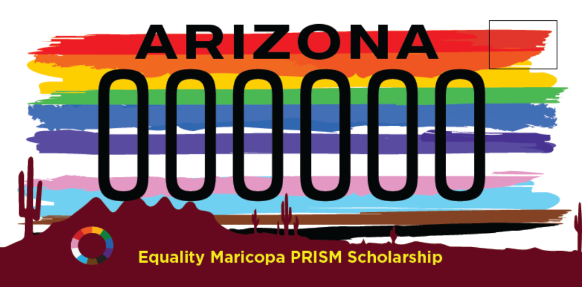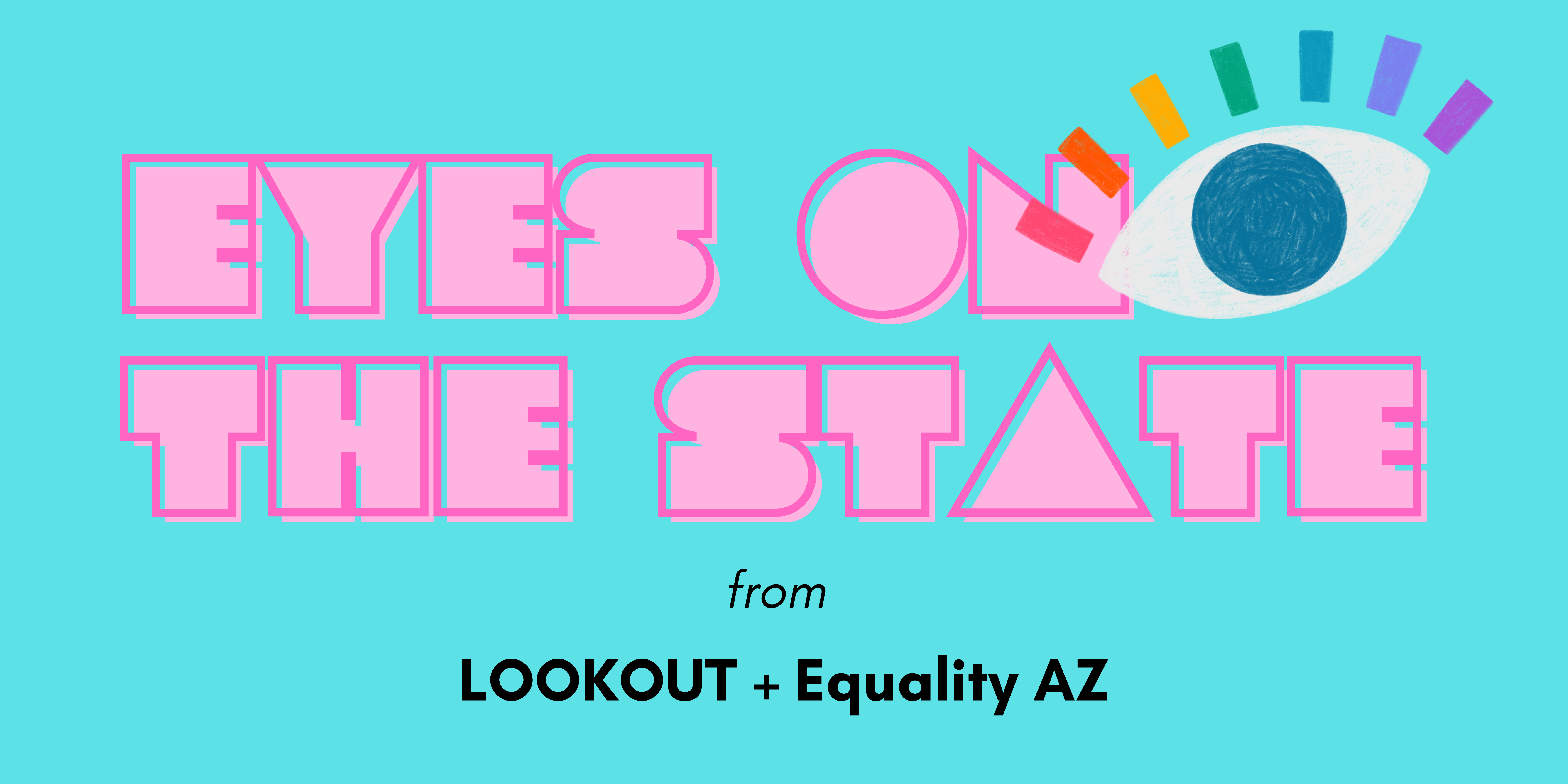Phoenix LGBTQ+ Community Suspicious After Sports Tournament Broken Up by Park Ranger, Police
Excessive intervention by police officers and a Phoenix park ranger during an LGBTQ+ sports tournament Sunday night left players uneasy and confused.
A group of educators at Maricopa Community Colleges is trying to get the plate passed through, but it will need financial and political support. PLUS... a new "Eyes on the State"

Queer students and staff at Maricopa Community Colleges are organizing to make Arizona the third state in the country to offer an LGBTQ+ specialty license plate for cars and other motor vehicles.
Arizona has dozens of license plates manufactured by state prisoners that raise money for different causes, from Barrett Jackson to wildlife conservation.
Equality Maricopa, an employee and student group at the community colleges, proposed a rainbow-colored license plate that would benefit the Prism Fund—a scholarship for queer and trans community college students at Maricopa Community Colleges.
“Our vision once we get this license plate is any LGBT student that applies for the scholarship will get it,” said Jay Franzen, an officer for Equality Maricopa. “It’s heart wrenching to go through these scholarship stories. All of our students need it. It’s really disheartening to know that we’re not able to give scholarships to all our LGBTQ+ students who need it.”
The scholarship fund is available to all queer and trans students, regardless of immigration status.
In June, Equality Maricopa is partnering with Wilderness Brewing to release a special “Prism brew” in commemoration of Pride month. With every pint of the “Prism brew” sold, Wilderness Brewery will donate a $1 to the Prism scholarship fund.
Equality Maricopa will hold their annual Prism drag ball fundraiser on October 13. Last year the event raised around $10,000. This year, the group is hoping to raise around $20,000. Plastique Tiara from Ru Paul’s Drag Race will be headlining the event and performing alongside five other local drag kings and queens.
Members of Equality Maricopa look at the license plate as a way of providing a sustainable future for queer and trans college students in Phoenix.
But there are roadblocks to getting the license plate approved by the legislature, and even before then.
Arizona law requires nonprofit organizations to raise $32,000 to cover the Motor Vehicle Division’s programming and production costs of the plate. Equality Maricopa has spent the past year and a half fundraising by hosting drag shows, raising donations, and partnering with local organizations.
So far, the group has raised $22,000, but they are hopeful they will raise enough to cover the fees for the license plate by the end of the year.
For a specialty plate to become legal, it must be introduced into the Arizona legislature. The bill must be passed by a legislative majority and make its way to Governor Hobbs desk who can then sign it into law.
Given the rise of anti-LGBTQ+ bills introduced and passed by the Arizona legislature, Equality Maricopa is worried they may not receive the support they need for the LGBTQ specialty plate to become available for drivers in Arizona.
Equality Maricopa has been working with Rep. Lorena Austin and Rep. Analise Ortiz to draft legislation for the plate that will be introduced in the Arizona House of Representative in Spring of 2024.
“We know we have an ally in the Governor’s office, but we’re very fearful that as soon as the Republican counterparts in this get a hold of it, they may be reluctant to sponsor this bill, but we feel that we have a strong legal standing should they not want to support this bill,” said Franzen.
Equality Maricopa went through several rounds of mockups before coming to the final iteration of the design. Members of the group wanted to find a way to pay respect to the state, while honoring the queer community.
The design of the Prism pride license plate is inspired by the iconic Arizona license plate.
The only difference?
“We wanted to pay homage to the Arizona license plate in its entirety and also have a splash of [queer] colors,” said Franzen.
In Equality Maricopa’s Arizona, the gradient of the desert sunset comes in the progress pride flag colors.
When a specialty license plate becomes law, $17 of each $25 fee from each purchase goes to the nonprofit group tied to the plate.
“Imagine we get to a point where we sell 10,000 license plates—that’s $170,000 a year in funding for our students,” said Franzen. “Right now the scholarship is only $500. There’s a real possibility that we change the scholarship criteria and make it more. The possibilities are really, really bright if we’re able to get this.”
If you’d like to donate to the fund to get the plate in front of state lawmakers, click here.
LOOKOUT relies on subscriptions and donations to keep our news free and consistent. For every $100 raised, we provide five people access to local queer news they won’t find anywhere else. Consider a 100% tax-deductible donation today.


What’s happening in the legislature?
After taking over a week off, the legislature returned to session on Tuesday to advance SB 1001 through the Committee of the Whole, before voting to take another week off. Every remaining anti-LGBTQ+ bill is now stalled in the House, waiting for a final floor vote before they can be sent to the Governor.
And while harassment against LGBTQ+ people has stalled (for now) in the state Capitol, we’re shifting our look to school boards, which is the second area of government where LGBTQ+ rights has entered into the culture wars.
There’s an old adage in politics that says people who care about voting need to be more aware of what happens at the hyper-local level, and there is no greater example of this than at school boards, where a number of groups have tried to make culture war issues top of the board’s agenda. Here is a bit of an update of where we’re at:
In 2023, mirroring similar pressure campaigns against elections workers, superintendents in multiple school boards have come under intense scrutiny for their inclusive policy positions. In the Casa Grande High School District, when superintendent Anna Battle was fired with no explanation at the end of January, one board member (Taylor Kerby) called out the clear racist motives for her termination in his vote to retain her. In the Scottsdale Unified School District, board members and legislators (including Senator Kavanagh) have called for the resignation of superintendent Scott Menzel over support for trans students. Similar to the balance of responsibility between a city council and city manager, it’s superintendents who are actually responsible for the operations of a school district, with school boards serving to create policy and — critically — to hire and fire the superintendent. Because of this, pressure campaigns to force out a superintendent are essentially a way to fast-track a cultural reset in a district.
Parallel to the attacks on superintendents, queer and trans school board members are facing targeted harassment in their districts, sometimes through misrepresentations in the media. After Washington Elementary School District voted to end a voluntary contract with Arizona Christian University over a violation of the school district’s nondiscrimination policy, board member Tamillia Valenzuela came under attack for her part in that decision. Criticism of the move highlighted her neurodivergence, ethnicity, and queerness while largely ignoring the participation of other board members in the unanimous vote to end the contract. Meanwhile, in Liberty Elementary School District, board member Paul Bixler has faced ongoing harassment and targeted threats simply for being a trans woman.
Regardless of whether a school board has formally added a policy for trans students to their agenda, intense discussions about trans inclusion have been spreading from district to district. Most recently, Heather Rooks, a Peoria Unified School District board member affiliated with the anti-LGBTQ+ organization Arizona Women of Action, proposed a trans-exclusive bathroom ban mirroring the legislature’s SB 1040. The measure failed by a 3-2 vote.
LOOKOUT Publications (EIN: 92-3129757) is a federally recognized nonprofit news outlet.
All mailed inquiries can be sent to 221 E. Indianola Ave, Phoenix, AZ 85012.